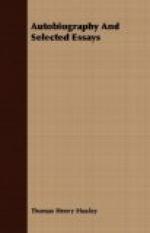“The design of this work, as stated by Pope himself, is to ridicule all the false tastes in learning under the character of a man of capacity enough, that had dipped into every art and science, but injudiciously in each. It was begun by a club of some of the greatest wits of the age—Lord Oxford, the Bishop of Rochester, Pope, Congreve, Swift, Arbuthnot, and others. Gay often held the pen; and Addison liked it very well, and was not disinclined to come into it.”]
[Footnote 108: accounted for the operation of the meat-jack: from the paper “To the learned inquisitor into nature, Martinus Scriblerus: the society of free thinkers greeting.” Elwin and Courthope, Pope’s works, vol. ?, p. 332.]
[Footnote 109: The remainder of the essay endeavors to meet the charge of materialism. The following is the conclusion:—“In itself it is of little moment whether we express the phaenomena of matter in terms of spirit; or the phaenomena of spirit in terms of matter: matter may be regarded as a form of thought, thought may be regarded as a property of matter—each statement has a certain relative truth. But with a view to the progress of science, the materialistic terminology is in every way to be preferred. For it connects thought with the other phaenomena of the universe, and suggests inquiry into the nature of those physical conditions, or concomitants of thought, which are more or less accessible to us, and a knowledge of which may, in future, help us to exercise the same kind of control over the world of thought, as we already possess in respect of the material world; whereas, the alternative, or spiritualistic, terminology is utterly barren, and leads to nothing but obscurity and confusion of ideas.
“Thus there can be little doubt, that the further science advances, the more extensively and consistently will all the phaenomena of Nature be represented by materialistic formulae and symbols. But the man of science, who, forgetting the limits of philosophical inquiry, slides from these formulae and symbols into what is commonly understood by materialism, seems to me to place himself on a level with the mathematician, who should mistake the x’s and y’s with which he works his problems, for real entities—and with this further disadvantage, as compared with the mathematician, that the blunders of the latter are of no practical consequence, while the errors of systematic materialism may paralyze the energies and destroy the beauty of a life.”]
ON CORAL AND CORAL REEFS (1870)
[Footnote 110: On Coral and Coral Reefs: from Critiques and Addresses. The essay was published in 1870.]
[Footnote 111: Sic et curalium: Thus also the coral, as soon as it touches the air turns hard. It was a soft plant under the water.]
[Footnote 112: Boccone (1633-1704): a noted Sicilian naturalist.]
[Footnote 113: Marsigli (1658-1730): an Italian soldier and naturalist. He wrote A Physical History of the Sea.]




